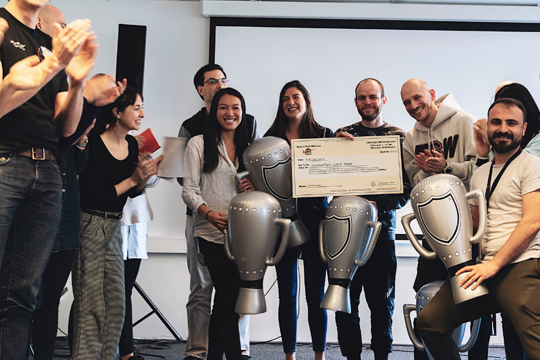
An Unconventional Idea To Nurture Growth Mindset
In this article, you'll learn to avoid the fear of failure that stifles creativity and instead create an environment where your team embraces mistakes as essential steps toward success.
You’ll learn:
-
How the concept of “F#*K Up Nights” can help your team embrace risk and learn from failure.
-
Why openly sharing stories of failure builds trust and fosters innovation.
-
Practical steps for implementing “F#*K Up Nights” in your organization to create a culture of growth.
You win when you make failure usable.
In most organizations, failure is seen as something to be avoided at all costs. It’s common for team members to feel a sense of shame or fear when they make mistakes, which can lead to risk-aversion and stagnation. The problem with this mindset is that failure is a natural and necessary part of innovation.
Without taking risks and trying new approaches, teams can get stuck in a cycle of doing what they’ve always done—resulting in limited growth and missed opportunities. If your team is hesitant to try new things because they’re afraid of failing, you may be missing out on the bold ideas and creative solutions that drive real progress.
Enter “F#*K Up Nights”, a concept that originated from startup culture but has since been embraced by larger organizations like Mercedes. These events create a space where failure is not only accepted but celebrated as a learning opportunity. By encouraging leaders and team members to openly share stories of their biggest failures, you remove the stigma surrounding mistakes and foster a culture where risk-taking and innovation thrive.
Why Fear of Failure Stifles Innovation
To understand the value of *F#K Up Nights, we need to recognize why fear of failure can be so damaging in organizations. When team members are afraid of making mistakes, several things happen:
-
Risk-Aversion: People tend to stick to safe, familiar methods and avoid experimenting with new ideas or approaches. This can lead to stagnation and a lack of innovation.
-
Reduced Creativity: When people fear failure, they are less likely to think outside the box. Creativity requires a certain level of risk-taking, and when that’s absent, so are novel solutions and bold ideas.
-
Missed Learning Opportunities: Mistakes are often the best teachers, but if team members are hiding or downplaying their failures, they miss out on valuable insights that could help them—and the entire organization—grow.
For companies like Mercedes, who operate in highly competitive and fast-paced industries, innovation is key to staying ahead. This is why Mercedes introduced *F#K Up Nights, where leaders openly share stories of their failures.
The idea is simple: by showing that even successful people make mistakes, you create an environment where everyone feels safe to take risks, experiment, and learn from failure.
The Concept of “F?#K Up Nights”
F?#K Up Nights are events where leaders and team members come together to share their biggest mistakes, missteps, and failures. The goal isn’t to dwell on the negative but to reframe failure as a critical part of the learning process. By turning mistakes into stories that are shared openly, you encourage a mindset where failure isn’t feared—it’s embraced as an inevitable part of trying something new.
Here’s why F?#K Up Nights work so well:
-
They remove the stigma of failure: When team members see their leaders sharing personal stories of failure, it normalizes the idea that failure is part of the journey to success.
-
They build trust and openness: By encouraging vulnerability, these events help foster a culture of trust where team members feel safe to speak up, share ideas, and take risks.
-
They accelerate learning: Openly discussing failures allows the entire team to learn from each other’s mistakes. This means that failures aren’t repeated, and the team becomes more resilient and adaptable over time.
Mercedes isn’t alone in embracing this concept. Across industries, F?#K Up Nights have become a popular way for companies to create environments where failure isn’t feared, but rather seen as a stepping stone toward innovation.
How to Implement F?#K Up Nights” in Your Organization
Implementing F?#K Up Nights in your organization can be an incredibly effective way to shift your team’s mindset and encourage more risk-taking and creativity. Here’s how you can do it:
1. Create a Safe, Supportive Environment
The key to making F?#K Up Nights successful is creating an environment where people feel safe sharing their failures. Start by setting the tone as a leader. You’ll need to go first and share your own stories of failure to show that vulnerability is valued and won’t be met with judgment.
Encourage an atmosphere of learning, support, and humor. It’s important that the tone of these events stays positive and focused on growth, rather than dwelling on the negative aspects of failure.
Tip: To break the ice, you could kick off the event by sharing a failure that’s humorous or light-hearted, before diving into more serious lessons learned.
2. Share Your Own Failures
As a leader, it’s essential that you model the behavior you want to see. Share a story about a time when you made a significant mistake—something that had real consequences. Be honest about the failure, but also focus on what you learned from it and how it helped you grow.
When leaders are open about their failures, it sends a powerful message to the rest of the team that it’s okay to fail as long as you’re learning from the experience.
3. Encourage Others to Share
Once you’ve shared your story, open the floor to other team members. Let them share their own stories of failure, and make sure to reinforce the idea that failure is a normal, expected part of the innovation process.
If your team is hesitant to speak up, you can gently encourage participation by asking open-ended questions, like:
-
“Can anyone think of a time when they took a risk that didn’t pay off, but they learned something valuable?”
-
“What’s one failure that changed the way you approach your work?”
Keep the conversation positive by focusing on the lessons learned and how those failures ultimately led to better outcomes or personal growth.
4. Make Failure Usable
One of the most important aspects of F?#K Up Nights is turning failure into something actionable. After the stories are shared, take time to discuss what was learned and how the team can apply those lessons moving forward.
Encourage your team to think about failure in a new way. Rather than seeing it as a loss, help them reframe failure as an opportunity to gain new knowledge. Ask questions like:
-
“What did we learn from this failure that we can apply to future projects?”
-
“How can we take this lesson and use it to avoid similar mistakes in the future?”
By turning failures into learning moments, you help your team build resilience and confidence in taking risks.
5. Celebrate the Learning
At the end of each F?#K Up Night, take a moment to celebrate the fact that your team is willing to take risks and learn from their mistakes. Recognize those who shared their stories and acknowledge the bravery it takes to be open about failure.
This celebration of learning is key to reinforcing the idea that mistakes are not to be feared—they are an essential part of growth and innovation.
The Benefits of Embracing Failure
By regularly holding F?#K Up Nights, you can begin to shift your organizational culture from one that fears failure to one that embraces it as part of the learning process. Here are a few key benefits your team will experience:
1. Increased Risk-Taking and Innovation
When team members know that failure is not only accepted but celebrated, they’re more likely to take risks and experiment with new ideas. This willingness to step outside their comfort zone is where innovation happens.
2. Stronger Team Trust and Morale
Openly sharing stories of failure creates an environment of trust and psychological safety. When people feel safe to take risks and admit mistakes, it fosters deeper collaboration and stronger team morale.
3. Faster Learning and Adaptation
When failures are shared openly, the entire team can learn from them. This accelerates the learning process and helps the team adapt more quickly to challenges, reducing the likelihood of repeated mistakes.
4. A Culture of Continuous Improvement
By normalizing failure and turning it into a learning opportunity, you create a culture where continuous improvement is the norm. Team members are constantly learning, iterating, and refining their approach to achieve better results.
How you can start applying these ideas
Here are some tips and reflective questions to help you implement F?#K Up Nights and encourage a culture that embraces failure:
1. Lead by Example:
-
Advice: Start by sharing your own failures to set the tone for openness and learning.
-
Thought Starter: What failure from my own experience can I share that would show my team that it’s okay to make mistakes?
2. Focus on the Lessons Learned:
-
Advice: Encourage team members to reflect on what they learned from their failures, rather than just focusing on the negative aspects.
-
Thought Starter: How can I help my team reframe failure as a valuable learning opportunity?
3. Make Failure Usable:
-
Advice: After failures are shared, discuss how the lessons learned can be applied to future projects. This helps ensure that failure leads to improvement.
-
Thought Starter: How can we apply the lessons from past failures to our current challenges?
4. Celebrate Learning, Not Just Success:
-
Advice: Recognize and celebrate the willingness to take risks and learn from mistakes. This reinforces a growth mindset in your team.
-
Thought Starter: How can I celebrate my team’s willingness to take risks, even when those risks don’t lead to immediate success?
Wrap-up: create a team culture where learning is the prize of bold action
Embracing failure is one of the most powerful ways to unlock innovation within your team. F?#K Up Nights provide a safe and supportive environment where mistakes can be openly shared, celebrated, and turned into valuable learning experiences.
By encouraging your team to take risks and see failure as part of the process, you create a culture where innovation thrives, learning accelerates, and trust deepens. In the end, it’s not about avoiding failure—it’s about learning from it and growing stronger as a result.
CHANGE BY SPRINT VALLEY
Ready for change?
Fast-track ambitious ideas and build a future-ready business your people are proud to be a part of.
